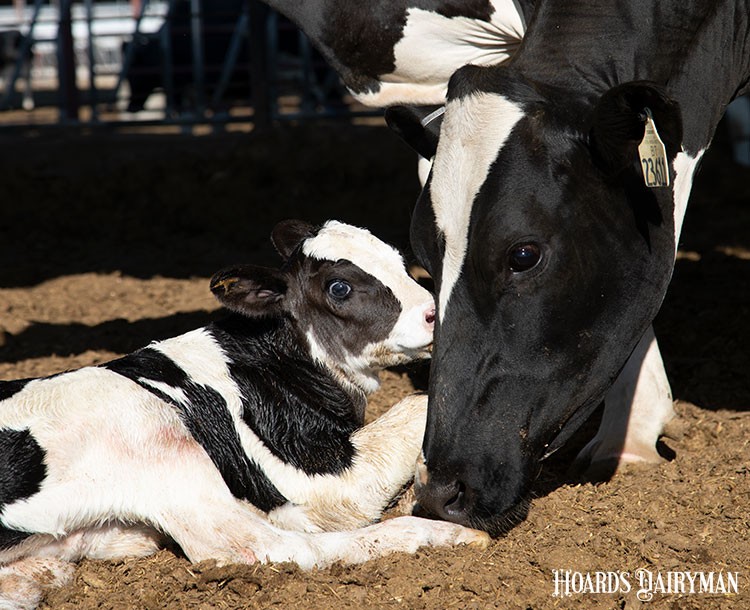Pathogen problems start in the maternity pen by Abby Bauer Hoards Dairyman
Pathogen problems start in the maternity pen
by Abby Bauer Hoards Dairyman
Once a calf is born, it faces many chances for pathogen exposure. From colostrum collection to feeding equipment and calf housing to older calves, many aspects of a farm contribute to a calf's pathogen load.
During her presentation at the American Association of Bovine Practitioner's (AABP) annual meeting, veterinarian Terri Ollivett placed her focus on the maternity pen and its role in calfhood respiratory diseases, such as pneumonia.
"It's really easy to overlook problems going on in maternity when dealing with pneumonia at 3 to 5 weeks of age," said Ollivett, an assistant professor at the University of Wisconsin-Madison School of Veterinary Medicine. But oftentimes, early life experiences contribute to calf health down the road.
The issue with maternity pens is density — both spatial density and temporal density.
When it comes to spatial density, Ollivett said that is a fancy way of saying a facility is overcrowded. The goal is to provide 150 square feet of resting space and 30 inches of bunk space per cow. When facilities are crowded, she explained that it is harder to see when cows are calving and it is more difficult to find a calf when it is born without walking through the pen and disrupting all the cows.
Calves that aren't found soon after birth are at higher risk for pathogen exposure in the pen, delayed colostrum feeding, failure of passive transfer, scours, and pneumonia. "More cows in the pen means more bugs for the calves to wear and share," Ollivett reiterated.
Temporal density, on the other hand, could mean plenty of space per cow but too many cows coming through the system. The result is multiple births between pen cleanings and more pathogen exposure for calves.
Ollivett shared an example of a dairy that had 12 calving pens. Rather than utilizing all the pens, the maternity staff had decided to use the four closest pens to improve labor efficiencies. However, the result was more calvings per pen without proper sanitation.
"Make sure to use all of the available space," Ollivett recommended. For this particular farm, they were able to solve a lot of their early calfhood health issues by simply numbering and using all of the maternity pens, allowing for time in between births to clean and disinfect those spaces.

Photo credit: Hoards Dairyman
Upcoming Events
Crops, Cows & Critters - Southwest New York Dairy, Livestock & Field Crops Newsletter Sponsorship
December 19, 2025
Our two forms of publications feature research-based and timely information from our four specialists, listed to the right, along with local event notifications and Cornell University outreach. This information is provided to participants who range from dairy, livestock, and field crops producers to agricultural suppliers and consultants.
Weekly Email Update: Shared with 625+ households who have signed up with our program.
Monthly Paper Mailer: To reach our stakeholders and farmers who lack internet access, we send out a monthly mailer where your company's logo and contact information would be featured with a mailing list of 330+ households.
If you sponsor our weekly and monthly publications you reach approximately 955 households.
Visit our website to view our newsletters!
2025 Cornell Food Beverage & Animal Feed Manufacturer Survey
December 19, 2025
Industry and Educational Advocates for New York State's Food, Beverage, and Animal Feed Manufacturing industries:
As you know, NYS has a diverse food and beverage manufacturing industry, in both the types of industries that exist and the wide distribution of firms by scale. Many manufacturing firms have strong backward linkages to agricultural production sectors in the state that support both farm-level and downstream food industry firms and consumers. In collaboration with the New York State Department of Agriculture and Markets, a team from Cornell University's Charles H. Dyson School of Applied Economics and Management has recently rolled out the 2025 New York State Food, Beverage, and Animal Feed Manufacturer Survey. The industry will benefit from an updated assessment of the industry that informs private and public investments and opportunities to support firm growth and improved profitability.
Cornell Organic Field Crops & Dairy Conference
March 6, 2026
Waterloo, NY
Farmers, researchers, educators, and agricultural service providers from across the Northeast are invited to the 2026 Cornell Organic Field Crops & Dairy Conference, held Friday, March 6, 2026, from 8:00 a.m. to 4:30 p.m. at the Lux Hotel & Conference Center in Waterloo, N.Y.
Co-hosted by New York Soil Health and Cornell CALS, the annual conference brings together leaders in organic grain, dairy, and livestock systems to share practical tools, new research, and farmer-tested strategies to support resilient and profitable organic production.
Announcements
No announcements at this time.





